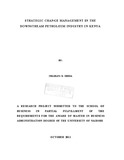| dc.description.abstract | The research was designed to investigate the management of strategic change in the downstream petroleum industry in Kenya. The study sought to achieve three objectives. The first objective was to identify key areas that are of strategic concern to firms and other stakeholders in the downstream petroleum industry in Kenya. The second one was to identify the challenges in the strategic change management process in the downstream petroleum industry in Kenya, while the final objective was to identify the change management approach that can be adopted to create a new synthesis of people, resources, ideas, opportunities and demands. The study adopted a survey approach. This approach allowed for information to be obtained from some members of the industry for purposes of generalization. A questionnaire targeting senior management staff was designed and used for primary data collection. Secondary data was also collected through company magazines, newsletters and newspapers. Content analysis was used in the analysis of data.
The findings of the study showed that despite the uncertainty that characterizes the petroleum industry and high probability of sudden changes, the downstream petroleum industry in Kenya prefers prefer planned changes. This is the case even though the industry anticipates strategic changes in their planning. Planned changes are preferred to un-planned changes for effective management and higher probability of success at implementing planned change. While the strategic change management was most necessary in products and services, acquisition and technology in the last five years, it was deemed to be least necessary in mergers. Strategic change management was largely initiated by company boards of directors and senior managers. In most cases, the initiator of the strategic changes is the same one who led the process while ensuring that employees are well informed about the changes.
The study found that there is resistance to strategic change in the downstream petroleum industry despite the fact that its effective management is useful and relevant. Involvement, education and counseling were most used in overcoming resistance while rescheduling and dispatch were the least used. Success at strategic change management in the downstream petroleum industry was largely influenced by management, industry standards, the employee training, corporate mission and vision as well as employee participation. It was found that Strategic changes in the downstream petroleum industry were relevant and of great impact on organizational efficiency, customer satisfaction and turn around/turn over.
The study findings led to the conclusion that strategic change management in the downstream petroleum industry in Kenya is best done if planned for in advance. The industry understands the value of the changes and as search requires that the drivers of the changes fully understand the dynamics and fundamentals in the oil industry so as to win directors, management and employees buy in so as to optimize the benefits that accrue from well managed change. | en |

